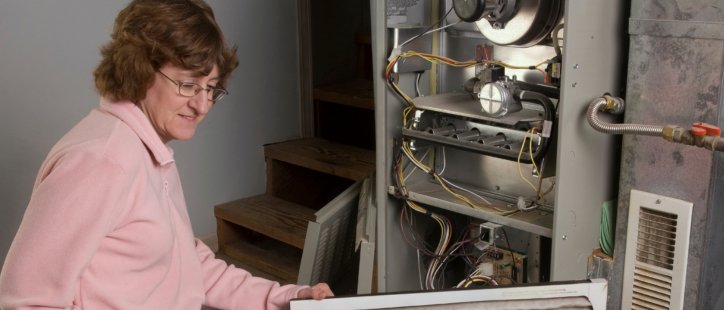Furnace Leaking Water: What You Need to Know and How to Fix It
Why Is My Furnace Leaking Water This article will help you identify the causes of a furnace leak and guide you on how to handle it

A furnace is an essential part of your home, especially during the colder months. It keeps your home warm and cozy, ensuring comfort and safety. However, if you start noticing water pooling around it, you may be wondering, "Why is my furnace leaking water?" While it can be concerning, a leaking furnace is often fixable with the right understanding. In this blog, we'll explore the common causes of furnace water leaks, how to spot them, and what to do to fix the issue.
What Causes a Furnace to Leak Water?
Several issues could be responsible for a furnace leaking water. The cause often depends on the type of furnace you have and how old it is. Here are some of the most common reasons for water leakage:
-
Condensation Leak High-efficiency furnaces, also known as condensing furnaces, produce condensation as they operate. These units use a second heat exchanger to maximize energy efficiency, resulting in extra moisture. Normally, the condensation drains through a tube. However, if the drain tube is clogged or cracked, it can cause water to leak around your furnace.
-
Humidifier Problems Some furnaces come with a built-in humidifier to regulate moisture levels in your home. If there's a leak in the water line or the humidifier's connections, it could lead to water pooling around the furnace. A loose or broken water line is usually the culprit.
-
Clogged Drain Line Most furnaces are equipped with a drain line to remove excess moisture. Over time, dirt and debris can clog this drain line, preventing water from flowing freely. If this happens, water will back up and leak out, potentially damaging your furnace and surrounding areas.
-
Broken Condensate Pump For systems with a condensate pump, its job is to move water away from the furnace. If the pump malfunctions or breaks, water may accumulate and start leaking. This issue is especially common in homes where the furnace is installed in a basement or below ground level.
-
Faulty Heat Exchanger Though rare, a cracked or damaged heat exchanger inside your furnace can cause water leakage. This issue is serious, as a cracked heat exchanger can also lead to carbon monoxide leaks, which pose a health risk. If you suspect this problem, it's crucial to contact a professional HVAC technician immediately.
How Can You Tell If Your Furnace Is Leaking Water?
There are a few clear signs that indicate a furnace leaking water:
- Puddles or Dampness: Water pooling around your furnace or wet spots on the floor are the most obvious signs of a leak.
- Musty Smell: Excess moisture can lead to mold growth, which causes a musty odor near your furnace.
- Increased Humidity: If you notice that the air in your home feels unusually humid, especially near the furnace, it may be due to a water leak.
Is a Leaking Furnace Dangerous?
While a leaking furnace may not be an immediate danger, it can lead to serious problems over time. Water around the furnace can cause rust and corrosion, damaging parts of your heating system and reducing its efficiency. In the worst-case scenario, a cracked heat exchanger could release carbon monoxide, which is hazardous to your health. Additionally, water damage could cause electrical issues, leading to more costly repairs.
How to Fix a Leaking Furnace
Fixing a leaking furnace requires identifying the source of the leak. Here's how you can troubleshoot and resolve the issue:
- Check the Condensation Drain: Inspect the condensation drain tube for any blockages or cracks. Clean it with a small brush or pipe cleaner if needed. If the tube is cracked, replace it to prevent further leaks.
- Inspect the Humidifier: If your furnace has a built-in humidifier, check for any leaks in the water line or loose connections. Tighten connections or replace parts as needed. If the humidifier is old or damaged, replacing it could be the best solution.
- Clear the Drain Line: If the drain line is clogged, try flushing it with vinegar or bleach to remove blockages and restore proper water flow.
- Test the Condensate Pump: If you suspect the condensate pump is faulty, unplug it and reset it. If this doesn't resolve the issue, the pump may need replacing. Consult a professional for pump replacement if necessary.
- Call a Professional for Complex Issues: If you're unable to locate the source of the leak or suspect a serious issue like a cracked heat exchanger, it's best to contact an HVAC technician. They can provide thorough inspection services to diagnose and repair the problem safely.
How to Prevent Furnace Leaks in the Future
Regular maintenance is key to preventing furnace leaks. Here are some tips to help keep your furnace leak-free:
- Schedule Annual Inspections: Have a professional HVAC technician inspect your furnace yearly to catch any issues before they become major problems.
- Clean the Condensation Line: Regularly clean the condensation line to prevent clogs. This simple step can save you from future headaches.
- Inspect Humidifiers and Drain Lines: Check your furnace's humidifier and drain lines for damage or wear. If parts are worn out, replace them promptly.
- Stay Alert for Warning Signs: Keep an eye out for puddles, musty smells, or increased humidity near your furnace. Addressing these signs early can prevent bigger problems down the line.
When to Call for Professional Help
If you've attempted basic troubleshooting and the leak persists, or if you suspect a more serious issue like a cracked heat exchanger, it's time to call a professional. An HVAC technician can assess your system and make necessary repairs, ensuring your furnace operates safely and efficiently.
Conclusion
A furnace leaking water is a problem that many homeowners encounter, but understanding the causes can help you address it quickly. Whether it's a clogged drain line, faulty humidifier, or a broken condensate pump, most furnace leaks are fixable with the right approach. Regular maintenance is crucial for preventing leaks and ensuring your furnace continues to run smoothly.
If you're dealing with a furnace leaking water, don’t wait to address the issue. Contact a trusted HVAC professional for expert assistance and ensure your home remains warm, safe, and dry!
What's Your Reaction?



















